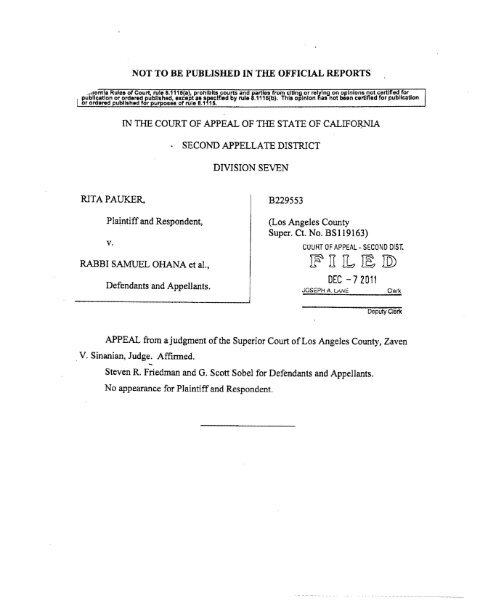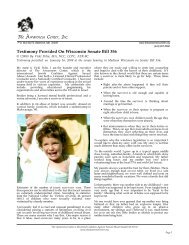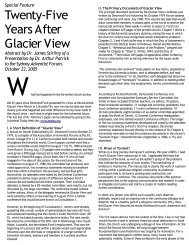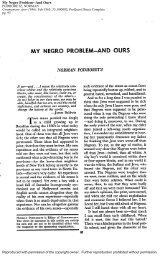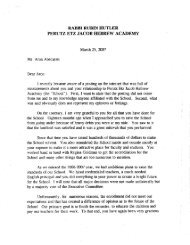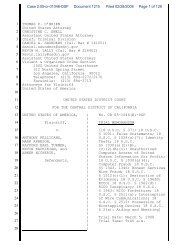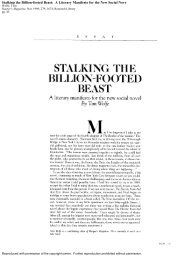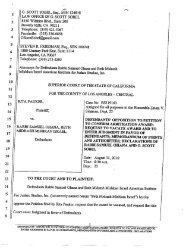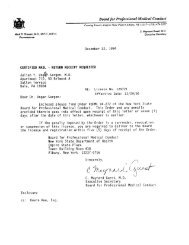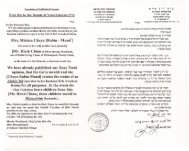You also want an ePaper? Increase the reach of your titles
YUMPU automatically turns print PDFs into web optimized ePapers that Google loves.
NOT TO BE PUBLISHED IN THE OFFICIAL REPORTSA ••oml; Rules of Court, rule 6.1115(at. prohibita courts and parties from citing or relyIng on oplnlonli not certlfled forI publicatIon or ordered published. except as specified by rule 1I.1116(b). This opinion nas not been certlfled for publicationor ordered ubllshed for u os•• of rule 8.1115.IN THE COURT OF APPEAL OF THE STATE OF CALIFO~IA- SECOND APPELLATE DISTRICTDIVISION SEVENRlTAPAUKERPlaintiff and Respondent,v.RABBI SAMUEL OHANA et al.~Defendants and Appellants.B229553(Los Angeles CountySuper. Ct. No. BS119163)CUURT OF APPEAL - SECOND DIST.IF IT11 ~JOSEPH A. lJo\JlIEDEe - 7 2011ill)ClerkDeputy ClerkAPPEAL from ajudgment of the Superior Court of Los Angeles County, Zaven.V. Sinanian, Judge. Affirmed.Steven R. Friedman and G. Scott Sobel for Defendants and Appellants.No appearance for Plaintiff and Respondent.
INTRODUCTIONAppellants Rabbi Samuel Ohana and Beth Midrash Mishkan Israel AmericanInstitute for Judaic Studies, Inc. (Beth Midrash)! appeal from ajudgrnent confirming anarbitration award. We affirm.FACTUAL AND PROCEDURALBACKGROUNDRita Pauker (Pauker) filed a petition to confirm an arbitration award of the BaisDin z of the Rabbinical Counsel of California. In it, she alleged that her deceasedhusband, Rabbi Norman Pauker, was the rabbi of a synagogue in North Hollywood, BethMidrash Mishkan Israel. Rabbi Pauker owned four Sifrei Torah-handwritten scrollscontaining the five books of Moses. Rabbi Pauker's sister had donated them to asynagogue in New York. When that synagogue closed, they were given to Rabbi Pauker.They were worth $100,000 to $200,000.When Rabbi Pauker retired and closed his synagogue in 1994, he transferred mostof the synagogue's assets to Rabbi Ohana and the new Beth Midrash. However,according to a handwritten contract between the two rabbis and signed by Rabbi Ohana,the four Sifrei Torah were to be loaned to the new synagogue for two years.Beginning in 1996, Rabbi Pauker demanded the return of the Sifrei Torah. RabbiOhana promised to return them but then gave excuses why he did not do so. RabbiPauker died in 2002, and Pauker begged Rabbi Ohana for the return of the Sifrei Torah.Again, he promised to return them but then gave excuses for not returning them.1 Beth Midrash was incorrectly named Beth Midrash Mishkan Israel in the petition.2 Bais Din (alternatively Beis Din, Beit Din or Beth Din) is a rabbinical court whichapplies Jewish law to the resolution of disputes. (Beth Din of America,http://bethdin.org/organization-affiliations.asp; Wikipedia,http://en.wikipedia.org/wikilBeth din.)2
Pauker hired attorney Baruch C. Cohen (Cohen) to prosecute her case before theBais Din of the Rabbinical Council of California. Cohen called Rabbi Ohana, requestingthat he voluntarily submit the matter to the Bais Din. Rabbi Ohana refused, claiming thathe already had received a ruling from Rabbi Nachum Sauer allowing him to keep theSifrei Torah. Cohen checked and found there had been no such ruling. He againrequested that Rabbi Ohana voluntarily submit to the Bais Din, and Rabbi Ohana againrefused.On June 16,2008, Cohen wrote to Rabbi Avrohom Union of the RabbinicalCouncil of California, requesting that he issue a summons to a Din Torah to Rabbi Ohanaand Beth Midrash. Rabbi Ohana agreed to binding arbitration before the RabbinicalCouncil of California, with Rabbis Sauer. Union and Gershon Bess to serve as arbitrators.On July 16, 2008, Rabbi Ohana and Pauker signed the agreement to submit to bindingarbitration.The arbitration was held, and on January 19,2009, the Bais Din issued itsjudgment. The court determined:"1. The parties stipulated that in 1994, the late Rabbi Norman Pauker transferredfour Sifrei Torah (Torah scrolls) to Rabbi Shmuel Ohanna. Beyond that determination,all of the facts surrounding the origin and ownership of the Sifrei Torah are in dispute."2. The Plaintiff seeks the return of the Sifrei Torah to her for the purpose ofdistributing them to family members serving in the Orthodox Rabbinate. TheRespondent maintained that he is not obligated to return the Sifrei Torah to her, andwishes to keep them in his synagogue."3. Based on the evidence and the law, the Beis Din determines that the SifreiTorah must rightfully be returned to Plaintiff for said distribution."4. The Respondent shall return, or arrange for the return, of the four Sifrei Torahto the Plaintiff within thirty days of this order."On January 27,2009, Cohen wrote to Rabbi Ohana "to arrange for the orderlyturnover of the four Sifrei Torah before the 30·day deadline," When he called to follow3
up on his letter, Rabbi Ohana hung up on him.Cohen wrote to Rabbi Ohana, asking himto "advise whether you will be complyingwith the Bais Din's ruling."In response, Rabbi Ohana retained attorney Scott Sobel (Sobel). Sobel indicatedthat Rabbi Ohana would not comply with the judgmentof the Bais Din unless Paukeragreed to his "settlement terms." These terms ''were so egregious and offensive, that theywere summarily denied and rejected." Pauker then filed her petition to confirmarbitration award on February 19,2009.Rabbi Ohana and Beth Midrash opposed the petition. The trial court vacated thearbitration award, i.e., the judgment of the Bais Din, on one of the grounds raised in theopposition, namely Rabbi Saur's' failure to disclose grounds for his disqualification as anarbitrator.(Code Civ. Proc., § 1286.2, subd. (a)(6).)Pauker moved for reconsideration of this ruling. The trial court denied hermotion.Pauker then filed a motion to compel binding arbitration.The trial court grantedher motion, finding "that pursuant to Code of Civil Procedure Section 1287, the Courtmay order a rehearing before new arbitrators who provide services under the auspices ofthe Rabbinical Council of California." The court then dismissed the action withoutprejudice but retained jurisdiction in order to confirm or deny any subsequent arbitrationaward.Cohen contacted the Bais Din and requesteda new hearing before new arbitrators.There followed disputes over the selection of the arbitrators and the date of an arbitrationstatus conference. The trial court ultimately vacated the status hearing date and againdismissed the case without prejudice while retaining jurisdiction to confirm or vacate thearbitrationaward.On July 12,2010, Pauker filed her second petition to confirm the arbitration awardof the Bais Din. To this petition, she added the allegations that a second Bais Din hearingwas held on January 13,2010. On May 10, Rabbi Sholom Tendler issued the judgmenton behalf of the Bais Din, ruling "that the four Torah Scrolls in questionare the propertyof the non-profit Valley Mishkan Israel Congregation of which Rita Pauker is the Agent.4
[~ Therefore the four Torah Scrolls should be returned to Ms. Pauker within 10 days ofthis ruling .... " Pauker then demanded the return of the Sifrei Torah, but Rabbi Ohanarefused to do so.Rabbi Ohana and Beth Midrash filed oppositionto the petition and requestedvacation of the arbitration award and entry of judgment in their favor. They claimed thearbitrator had no authority to award the Sifrei Torah to Valley Mishkan IsraelCongregation, which was not a party to.the arbitration agreement; the arbitrator violatedtheir right to counsel by excluding one of their two attorneys from participating in theproceedings; and the Rabbinical Council of California showed extreme prejudice againstthem.The trial court granted the petition and confirmed the arbitration award, enteringjudgment in Pauker's favor.DISCUSSIONThe Legislature through the provisions of the Code of Civil Procedure has,established '" a strong public policy in favor of arbitration as a speedy and relativelyinexpensive means of dispute resolution.'?' (Moncharsh v. Heily & Blase (1992) 3Ca1.4th 1,9.) For this reason, the courts indulge every intendment in favor of anarbitration award. (Ibid.) Under Code of Civil Procedure section 1286.2, there are onlylimited grounds upon which an arbitration award may be vacated. (Reed v.•MutualService Corp. (2003) l06Cal.AppAth 1359, 1365.) A party seeking vacation of anarbitrationaward must show that one of the grounds set forth in Code of Civil Proceduresection 1286.2 exists and must show substantial prejudice. (United Brotherhood ofCarpenters etc., Local 642 v, DeMello (1972) 22 Cal.App.3d 838, 840.) We review thetrial court's ruling de novo. (Advanced Micro Devices, Inc. v, Intel Corp. (1994) 9Ca1.4th 362,376, fn. 9.)One of the grounds for vacating an arbitration award is that "[t]he arbitratorsexceeded their powers and the award cannot be corrected without affecting the merits of5
the decision upon the controversy submitted." (Code Civ. Proc., §1286.2, subd. (a)(4).)An arbitrator exceeds the scope of his or her powers by acting without subject matterjurisdiction, deciding an issue not submitted to arbitration, arbitrarily remaking acontract, upholding an illegal contract, issuing an award that violates public policy or astatutory right, fashioning a remedy not rationally related to the contract, or selecting aremedy not authorized by law. (O'Flaherty v. Belgum (2004) 115 Cal.App.4th 1044,1055-1056.) We give substantial deference to the arbitrator's determination as to thescope of his or her powers. (Advanced Micro Devices, Inc. v. Intel Corp., supra, 9Ca1.4th at p. 372; o 'Flaherty, supra, at p. 1056.)However, an arbitrator does not exceed his or her powers "merely by rendering anerroneous decision on a legal or factual issue, so long as the issue was within the scope ofthe controversy submitted." (Moshonov v. Walsh (2000) 22 Ca1.4th 771, 775.) Similarly,"unless expressly restricted by the agreement of the parties," an arbitrator has "theauthority to fashion relief [he or she] consider[ s] just and fair under the circumstancesexisting at the time of the arbitration, so long as the remedy may be rationally derivedfrom the contract." (Advanced Micro Devices, Inc. v. Intel Corp., supra, 9 Ca1.4th atp.383.) We will uphold the award "so long as it was even arguably based on thecontract." (Id. at p. 381.)Appellants first contend that since it had no contract to arbitrate with ValleyMishkan Israel Congregation, the arbitrator had no authority to make an award in itsfavor. The authority on which they rely does not support this contention, however.Nguyen v. Tran (2007) 157 Cal.AppAth 1032, 1036 holds that "only parties to anarbitration contract may enforce it or be required to arbitrate." The other authoritiesappellants cite have similar holdings. As stated in County of Contra Costa v. KaiserFoundation Health Plan, Inc. (1996) 47 Cal.App.4th 237 at pages 244 through 245,"Public policy favors arbitration as an expedient and economical method of resolvingdisputes, thus relieving crowded civil courts. However, arbitration assumes that theparties have elected to use it as an alternative to the judicial process. [Citation.]Arbitration is consensual in nature. The fimdamental assumption of arbitration is that it6
may be invoked as an alternative to the settlement of disputes by means other than thejudicial process solely because all parties have chosen to arbitrate them.[Citations.]Even the strong public policy in favor of arbitrationdoes not extend to those who are notparties to an arbitration agreement or who have not authorized anyone to act for them inexecuting such an agreement. 'The right to arbitration depends on a contract.'[Citations.] A party cannot be compelled to arbitrate a dispute that it has not elected tosubmit to arbitration. [Citation.] A party can be compelled to arbitration only when he orshe has agreed in writing to do so. [Citations.] In essence, an action to compelarbitration is a suit in equity to compel specific performance of that contract. [Citation.]Absent a written agreement--or a preexisting relationship or authority to contract foranother that might substitute for an arbitration agreement-courts sitting in equity maynot compel third party nonsignatoriesto arbitrate their disputes."The arbitrator ruled "that the four Torah Scrolls in question are the property of thenon-profit Valley Mishkan Israel Congregation of which Rita Pauker is the Agent.[m Therefore the four Torah Scrolls should be returned to Ms. Pauker within 10 days ofthis ruling .... " That the Sifrei Torah are now the property of Valley Mishkan IsraelCongregation does not mean that the arbitrator necessarily resolved a dispute betweenappellants and Valley Mishkan Israel Congregation in the absence of an agreement toarbitrate between the parties. Pauker stated in her declaration in reply to appellants'opposition to the petition to confirm: "I am the Plaintiff in this matter; further, I amAgent and only Principal of Valley Mishkan Israel Congregation." Clearly, she had theauthority to make the determination that the Sifrei Torah belonged to the congregationrather than to her personally.Moreover, the arbitrator ordered that the Sifrei Torah be returned to Pauker, aparty to the arbitration agreement. This order supports the conclusion that the arbitratorconducted an arbitration of the dispute between Pauker and appellants.As the trial court observed, appellants "have not pointed to any provision in thearbitration agreement that prevents such an award." If. at the time of the arbitration, theSifrei Torah belonged to Valley Mishkan Israel Congregation as a result of actions taken7---------------
•by Pauker, the arbitrator certainly had the authority, in arbitrating the dispute betweenPauker and appellants, to order that appellants return the Sifrei Torah to Pauker, and torule that the Sifrei Torah were now the property of Valley Mishkan Israel Congregation.(Advanced Micro Devices, Inc. v. Intel Corp., supra, 9 Ca1.4th at p. 383.)Appellants' additional claims regarding the interpretation of the arbitrationcontract and the propriety of the award rest on the assumption that the arbitratorimproperly arbitrated a dispute between appellants and VaHey Mishkan IsraelCongregation. Inasmuch as the assumption is incorrect, these claims fail.Appellants next contend that the Bais Din did not have the authority to deprivethem of their chosen counsel, and it was prejudicial error to inform them on the day thearbitration took place that they could have only one attorney represent them in thearbitration. They also claim the limitation to one attorney violated the express wordingof the arbitration agreement.Sobel stated in his declaration in opposition to the petition to confirm thearbitration award that he and Steven R. Friedman (Friedman), the other attorneyrepre~enting appellants, arrived at the location where the arbitration was to take place. Atthat time, the arbitrator announced that each party would be allowed to have only oneattorney attend the hearing. Sobel "explained that each of defense counsel was assignedand prepared to argue a different area of the law: that [Sobel) was prepared to presentwitnesses and argue issues of State and Federal law, while Rabbi Ohana had retained[Friedman] to address or argue issues of Jewish law. The arbitrator stated in response:'With all due respect, I don't need to hear argument from Mr. Friedman on Jewish law."The trial court rejected appellants' claim that they were denied their right tocounsel, explaining that they had not cited any authority which supported their position.On appeal, they cite cases which stand for the proposition that the terms of the arbitrationagreement control the arbitration. (See, e.g., Freeman v. State Farm Mut. Auto. Ins. Co.(1975) 14 Ca1.3d473,481; Rhodes v. California Hospital Medical Center (1978) 76Cal.App.3d 606, 609.) In their view, the use of the plural "attorneys" in the arbitration8--------------- ----------~------ ---- ------ --- --- --- --- - --- ~ --
agreement gave them the right to have two attorneys present during the hearing. Wedisagree.The provision at issue reads: "We understand that we have the right to berepresented by attorneys or other advisors in the arbitration at any time but that any partymay elect to proceed without an attorney and the parties have the right to argue forthemselves before the arbitrators." Because the plural "attorneys" is used in conjunctionwith the plural "parties," it is clear the meaning of the term is that each party may berepresented by his or her own attorney or advisor. (Cf. California Mfrs. Assn. v. PublicUtilities Com. (1979) 24 Ca1.3d 836, 844.) While the language does not precluderepresentationrepresentation.of a party by more than one attorney, it does not create a right to suchAppellants also cite Code of Civil Procedure section 1282.4, subdivision (a),which provides: "A party to the arbitration has the right to be represented by an attorneyat any proceeding or hearing in arbitration under this title." This section refers to "an"attorney. Nothing in this provision can be interpreted to confer a right to multipleattorneys at an arbitration hearing. (See Prachasaisoradej v. Ralphs Grocery Co., Inc.(2007) 42 Ca1.4th 217,227 [if the language of the statute is clear and unambiguous, wewill give effect to its plain meaning].)Appellants also claim the arbitration award should have been vacated because "if aparty resisting arbitration can show that the rules under which arbitration is to proceedwill operate to deprive him of what we in other contexts have termed the common lawright of fair procedure, the agreement to arbitrate should not be enforced." (Graham v.Scissor-Tail, Inc. (1981) 28 Cal.3d 807, 826.) Appellants argue that the "[r)ight tomultiple counsel is preserved in the arbitration agreement, which was created by the[Rabbinical Counsel of California). [~ Only after the fight over the original 'award' waslost did the [Rabbinical Counsel of California] unilaterally, and at the 12th hour, changethe rules and violate[] the terms of the arbitration agreement." Since the arbitrationagreement did not provide appellants with the right to be represented by more than one9
attorney, there was no violation of their contractual rights. They cite no lawdemonstrating a violation of their common law rights.Appellants also contend that the arbitration award should have been vacatedbecause the arbitrator "was subject to conflicting and personal obligations," having been"placed in the impossible predicament of having to discredit the organization he workedfor by finding against the prior three arbitrators if the award followed the evidence andwas different than the prior award." In the absence of any citation to the record orauthority to support their claims of bias or impropriety, we reject this contention. (In reMarriage of Falcone & Fyke (2008) 164 Cal.App.4th 814,830; Benach v. County of LosAngeles (2007) 149 Cal.App.4th 836, 852.)DISPOSITIONThe judgment is affirmed, Appellants are to bear their own costs on appeal.JACKSON,J.We concur:PERLUSS, P. J.ZELON, J.10


